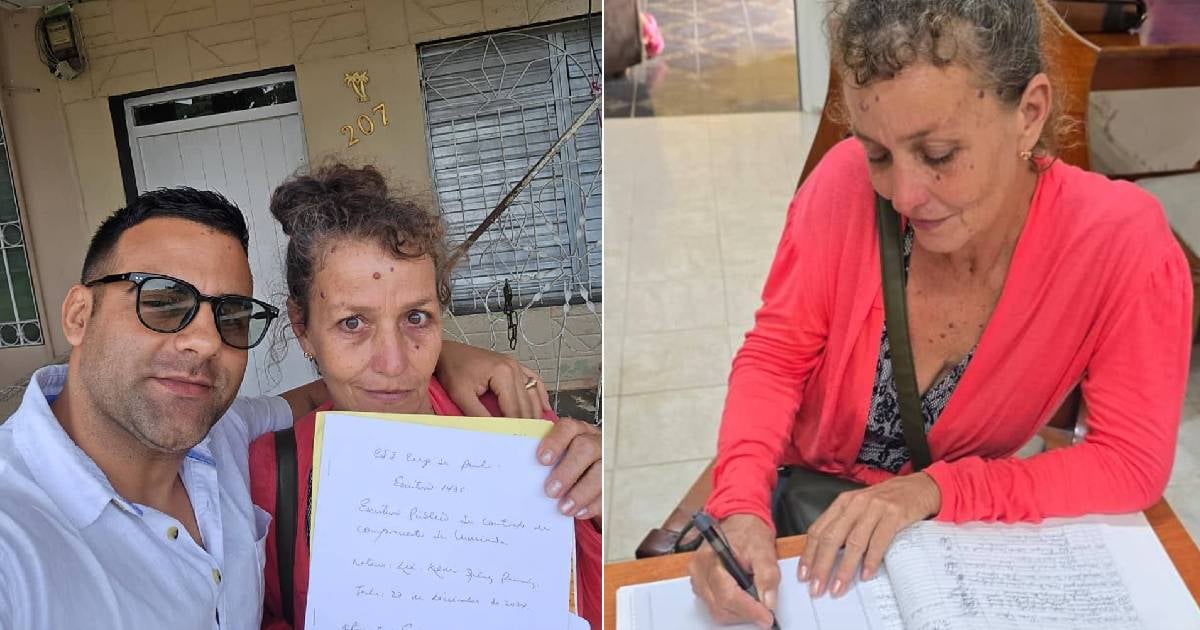
Related videos:
The Cuban community has set a powerful example of solidarity and empathy by coming together to transform the life of Evelyn, a preschool teacher from Avila, whose home suffered significant damage after Hurricane Irma in 2017.
Her story, widely shared by independent journalist Guillermo Rodríguez Sánchez, moved hundreds of people both inside and outside of Cuba, who contributed resources to ensure that she and her mother, affected by an orbital tumor, could have a decent place to live.
"I asked you for patience, I asked for a few days to organize the entire process, and here I am back to show you the results as you deserve," Rodríguez wrote in an emotional message posted on social media.
Thanks to financial donations totaling over one million 440 thousand pesos in National Currency, along with the logistical and human support of dozens of people, Evelyn not only signed the documents for her new home before a notary but now lives in a block house featuring three rooms, a tiled bathroom and kitchen, and wooden closets.
The process involved the collaboration of various stakeholders, including neighbors and friends, as well as bank officials, notaries, and legal consultants, who facilitated the procedures.
"I have never enjoyed watching someone burst into tears as much as when Evelyn signed the documents that officially made her the owner of her new home," Rodríguez added.
The funds raised not only ensured the purchase of the home but also covered notary fees, taxes, and transportation costs, in addition to providing Evelyn with an extra amount to meet her basic needs.
This story highlights the ability of Cubans to unite and overcome challenges in a complex economic context. As Rodríguez noted, "Because the teachers of our boys and girls deserve the world, even if some forget that."
Solidarity among Cubans has been essential in facing adversities and supporting those in need in various regions of the country.
In Banes, Holguín, a group of Cubans led by the activist Norge Ernesto Díaz Blak, known as Noly Black, raised funds to purchase a home for a mother living in precarious conditions with her daughter who has special needs.
The house, purchased for 200,000 pesos, represents a significant improvement in their quality of life and serves as a testament to the power of community solidarity.
In Santiago de Cuba, the San Pedro Mission, located in the Reparto Flores, organized a solidarity lunch that benefited 200 people, including bedridden patients who were unable to attend in person.
The menu, prepared thanks to donations from contributors, was distributed both at the mission and to the homes of those who were unable to travel, demonstrating the religious community's commitment to the most vulnerable.
In Cárdenas, Matanzas, a group of volunteers organized a solidarity event to distribute food to families in need during Christmas.
The initiative, led by Idalmys and supported by local residents and businesses, allowed many families to enjoy a special dinner amid the economic difficulties facing the country.
Frequently Asked Questions about Community Solidarity in Cuba and the Housing Situation
How was the fundraising achieved to help Evelyn and her mother in Ciego de Ávila?
The collection of over one million pesos and around a thousand dollars was achieved in just four days thanks to a solidarity campaign launched by Guillermo Rodríguez Sánchez and Yunior Tamayo Barrios. The initiative went viral on social media, allowing for the rapid gathering of the funds needed to purchase a suitable home for the family.
What is the housing situation of Evelyn and her mother in Ciego de Ávila?
Evelyn and her 88-year-old mother live in a house that is on the verge of collapse, lacking a bathroom, water, kitchen, and appliances. The house was devastated after the passage of a hurricane and has never received the promised assistance from the government for its reconstruction, forcing the community to step in to change their situation.
How have Cubans reacted to the lack of government support in situations of extreme poverty?
Community solidarity plays a crucial role in Cuba, where citizens come together to assist families in situations of extreme poverty. These actions include purchasing homes, repairing residences, and donating essential items, compensating for the lack of government response.
Are there other examples of citizen solidarity in Cuba?
Yes, there are several examples of solidarity in Cuba. Among them, a notable case is the purchase of a house for a retired teacher in Ciego de Ávila by his former students, and the provision of a home to a mother living in extreme poverty in Holguín, thanks to a campaign led by activist Norge Ernesto Díaz Blak. These actions reflect the ability of Cuban civil society to unite and offer support during times of crisis.
What challenges do Cuban families living in extreme poverty face?
Cuban families living in extreme poverty face multiple challenges, such as inadequate housing, lack of access to food and medicine, and economic difficulties in meeting basic needs. The housing crisis and resource scarcity are recurring issues that compel the population to seek community support and donations to get by.
Filed under: